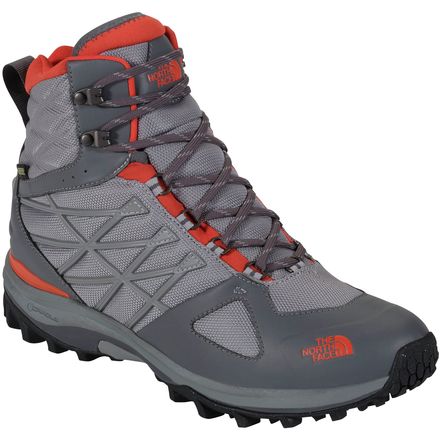Finding the right boot for winter activities can be a real challenge sometimes. You obviously want something warm and comfortable that can provide good traction on snow and ice, but all too many times that comes at the expense of weight and bulk. That isn’t the case with the new Ultra Extreme II GTX boots from The North Face however, as this is footwear designed for the cold and snowy season that doesn’t have to make compromises for the sake of performance.
One thing is for certain, these boots definitely know how to make a first impression. Taking them out of the box for the first time, I was struck with just how lightweight they are, but was a little dubious about how well they would perform as a result. The boots look great too, and feature TNF’s signature high quality build construction.
Last week I took these boots with me to Utah for a little pre-Outdoor Retailer adventure in the mountains near Park City. With plenty of snow on the ground I figured that would make a great test for this lightweight winter boot. I discovered that they performed better than I expected in most areas, particularly when taking part in winter activities such as snowshoeing and fat bike riding.
The boots feature a Gore-Tex liner that provides not only warmth and insulation, but a layer of waterproofing as well. My winter camping trip began with an evening of outdoor cooking and dinner shared with other writers and media folks, which ended up with most of staying out in the cold for more than four hours. Throughout that time, my feet stayed warm and dry, although by the time we were ready to call it quits for the night, my toes were starting to get a little frosty. But that is to be someone expected when you’re standing around in cold weather conditions for extended periods of time. The next day when I set out on the trail for some snowshoeing, my feed remained plenty warm throughout the hike. Better yet, they also stayed dry, despite the fact the snow was quite deep.
Because these boots are so lightweight, they are also incredibly comfortable to wear, even on active excursions. Prior to setting out for Utah, I had only taken them out of the box and worn them around the house for a bit, but that was enough to tell me they wouldn’t take long to break in. That turned out to be true, as after only wearing them for an hour or two, they were pretty much ready to go once I reached my destination. By the time I strapped on my snowshoes they already felt completely natural on my feet.
To give the Ultra Extreme II GTX boots plenty of grip on a variety of surfaces, The North Face uses a Vibram Icetrek outsole. This helps the shoes to stay stable in a variety of conditions, ranging from completely dry, to soaking wet, to frozen solid. Hiking in these boots on snow and ice, even without snowshoes, was a breeze, and I never once felt like they weren’t up to the task. If anything, the grippy nature of the soles provided more confidence when tackling those conditions.
One of the the things that I like most about these boots is that they don’t actually feel like you’re wearing boots. The fit and comfort levels are more akin to an athletic shoe, albeit one with lots of ankle support. In fact, the UE II GTX’s felt so good on my feet that I didn’t bother to take them off for hours after we had left our snowy campground. Because they felt so great on my feet, and provided a nice level of warmth, there was simply no need, even after I had returned to Salt Lake City for the start of the convention.
If you’re in the market for a lightweight hiking boot for active winter sports, these boots are more than up to the task, and with a price tag of $150, they are also quite a bargain in my opinion. Winter boots aren’t cheap, and a good pair will generally set you back more than what The North Face is asking here. But as comfortable as these are on your feet, and as lightweight as they are in your pack, it is easy to recommend them for anyone who enjoys winter outdoor activities.
That said however, the Ultra Extreme II GTX is probably a bit too lightweight for extremely cold conditions. I used them in temperatures hovering around 20ºF (-6ºC) and had absolutely no problems, particularly when I was on the move. But if the temperatures dropped below 10ºF (-12ºC) I would have definitely wanted warmer socks at the bare minimum, and possibly warmer boots all around. Aside from that however, they performed exceptionally well, and I found myself truly falling in love with them. This is a great boot not just for winter sports, but cooler weather hikes as well, and I have a feeling I’ll be getting a lot of use out of them in the weeks to come.
- Gear Review: The Xero Scrambler Mid is an Ultralight Hiking Shoe for Spring - March 1, 2023
- Gear Review: Yeti Roadie 48 Wheeled Cooler - August 18, 2022
- Kristin Harila Continues Pursuit of 8000-Meter Speed Record - August 16, 2022
